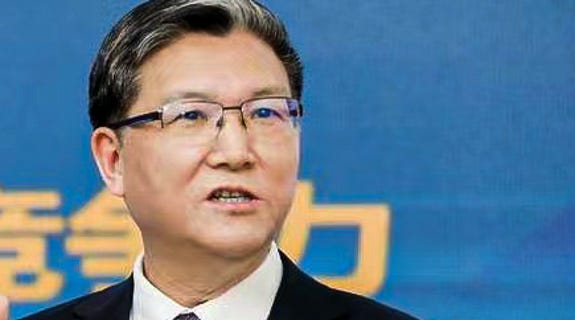A Henan cadre, invited to a banquet by the Xinyang County Politico-legal Affairs Secretary in March, died after one toast too many. Attempts at a cover-up proved futile. This was the second known alcohol-related death of a CPC official within as many weeks.
The timing of the case was career-ending for the Xinyang County branch: they had just undergone inculcation in the ‘eight-point rules’ on work conduct. The secretary was expelled from the Party; his accomplices suffered penalties and demotions. In a climate of heightened public discontent, their transgression was interpreted as undermining the Party's legitimacy.
Banqueting and drinking on the public purse remain grave violations of Party discipline. Xi Jinping laments that corruption is still the ‘greatest threat’ to the Party and State.
want to master Beijing’s policy playbook?
back to the 'eight-point' campaign
The Central Committee issued a Notice in March 2025, urging the renewal of the now decade-old ‘eight-point rules’. Triggered by Xi’s anti-corruption edicts, the original set appeared in December 2012, targeting the ‘four decadences’
formalism: disingenuously going through the motions
bureaucratism: dodging accountability and buck passing
hedonism: indulging in luxury, neglecting duties
extravagance: wasteful opulence with public funds
The new push reinforces doctrinal inculcation with more penalties. Party Committees nationwide are on notice to host study sessions for rote-learning Xi’s injunctions on Party conduct and the ‘eight points’. Cadres must meanwhile identify persistent disciplinary breaches, integrating public complaints, internal inspection and regulation upgrades to eradicate ‘irregular’ behaviour.
Given the Party’s Byzantine structure and the nation’s vast scale, the Central Organisation Department urges cadres to attend to regional, sectoral and temporal parameters of irregularities. Addressing misguided trends entails multi-level coordination
higher levels must lead in rectification, as bad conduct spreads top-down
agencies must cooperate against issues common to more than one of them
needs to learn about how Beijing is changing its trade policy?
annual inculcation
While the tone of this campaign is shrill, disciplinary and loyalty-related inculcation has been rolled out incessantly over the past decade.
To prevent the regime ‘changing colour’, the Party staged eight such campaigns from 2013 to 2025, explains Cui Lihua 崔丽华 Central Party School Sinified Marxism Research Institute. Reforming work culture, they realigned the rank-and-file with central value judgements and policies in the hope of earning popular support.
Core themes of the eight points, avoiding waste and bureaucratism, are in step with recent development strategy. Compiled by the CCDI (Central Commission for Discipline Inspection), official study material links the measures to development priorities
recycling: supporting the transition to low-carbon development
fiscal favourites: channelling more funds into innovation, education and healthcare
state-business ‘purity’: letting firms focus on business, untrammelled by gift-giving or bribery
No doubt inflated, such claims convey the Central Committee’s point: pressing cadres and rank-and-file to step up development. Inculcation must advance high-quality development, the PRC’s antidote to the US trade war.
can governance govern?
In responding to the trade war, cadres must swiftly translate central decisions into executable measures, urges Zhang Zhanbin 张占斌 Central Party School Chinese-style modernisation research centre. Even if inculcation reform fails to yield immediate results, cadres must lay the groundwork for future growth; compliance is an index of loyalty to the Party leader.
More such thinking is reflected in local practice. Wuhan’s Party Committee Organisation Department reports tighter vetting of cadre promotions, checking track records in
promoting industry development
attracting investment
urban renewal
The Department carried out routine interview sessions, screening Party leadership at all levels. The stated aim is to root out the ‘corrupted’, uncover wrongdoing in the frontline, and rate net contributions to administrative work.
rule by frugality
Redirecting spending is a major aspect. At the campaign’s height, the CPC and State Council in May 2025 altered course on promoting frugality and opposing waste. Echoing the ‘eight points’, original frugality rules were issued in 2013 to curb unjustified outgoings.
Rules cracking down on domestic travel using official funds, official overseas trips, the use of official vehicles, meetings, and office space design were amended in 2025. People’s Daily followed up, nudging Party-state agencies to tighten their belts. First voiced in the 2023 Central Economic Work Conference, the demand became a guiding principle for provincial budgeting.
Capping official perks failed to save much: Tianjin’s 2024 budget was C¥362 bn, yet administrative spending cut only some C¥8.76 bn. Yet the order holds symbolic meaning: money intended for public causes is not to be spent gratifying cadres.
The quality of public services will not be lowered, vows People’s Daily, despite budget downsizing. It notes instead, citing the MoF (Ministry of Finance) data, that public spending growth from January to April 2025 reached a post-2020 peak. Civil servant salaries will be paid in accordance with the law: agencies will adhere to the guidelines for paying salaries in line with responsibilities.
sustainable discipline
The campaign is scheduled to wind up in late July. While ‘eight points’ study sessions may be phased out, the Party will not let up on internal checks and balances.
The ‘eight points’ sought to kickstart disciplinary system building, argues Ren Hongda 任宏达 CASS (Chinese Academy of Social Sciences) Institute of International Law. Introduced in 2012, the measures have been incorporated into over 315 Party internal regulations, with enforcement supported by guiding cases issued by the CCDI and the NSC (National Supervision Commission).
Dynamically upgrade supervision in future, localities are advised. To realise the spirit of the eight-point regulation, Zhang Zhong 张忠 Jiangsu Provincial Party Committee CDI, reports building a digital oversight platform that bridges provincial, municipal and county levels. Pooled resources enhance data cross-referencing and filtering, enabling the CDI to detect potential disciplinary breaches more effectively.
Disciplinary action under the eight points would persist, Xi asserted in 2013, until a clean, non-corrupt Party culture has formed. With over a million violations detected by 2024—and approximately 60,000 cases investigated in 2024 alone—it's a never-ending story. It may just be that the problem is in plain sight.
profiles
Zhang Zhanbin 张占斌 | CPC Central Party School Marxist Theory Institute and Chinese-style Modernisation Research Centre director
Rolling out strategic initiatives is vital for cadres to break the PRC’s endless geopolitical rivalry and domestic reform stagnation, finds Zhang. Political awareness, professionalism and innovation are essential. Digital tech and regional coordination will be central to bringing action together across sectors. Central directives need to be remoulded into actionable plans, balancing high-level opening up and supply chain autonomy while catering to local contexts. Cadres should persist in reforms of strategic significance, such as education reform and building innovation capacity, despite the absence of immediate performance outcomes. To raise policy skills within the bureaucracy, Zhang recommends further internal training on law, policy and industry. Learning is to be assessed via a refined performance system, rewarding reform by tolerating failed trials, while penalising the idle.
Now directing the Central Party School's School of Marxism and its Chinese-style Modernisation Research Centre, historian and economist Zhang is a vice secretary-general of CSOAR (China Society of Administrative Reform) and a member of CCIEE (the China Centre for International Economic Exchanges). He has been a CPPCC delegate and a consultant to central and local governments. He has carried out state-funded research on industrial policies, innovation, and urbanisation.
know someone tracking Beijing’s trade policy shift?
CPC Central Committee General Office Law and Regulation Bureau | 中央办公厅法规局
Rule by law in the PRC, according to the Law and Regulation Bureau, requires Party regulations to be harmonised with state law. Party-state agencies with similar functions, e.g., the Central Commission for Discipline Inspection and the National Supervision Commission, have merged into one in the past decade, calling for the joint enforcement of Party rules and state laws. Clarifying their relations, the Bureau pledges to roll out soon a ‘Regulation on CPC leadership over the rule by law’, asserting Party writ in law-making, enforcement, adjudication, and abidance. A pre-deliberation review mechanism is also promised to ensure that party regulations are consistent with the Constitution. Merging inspections, oversight, and assessments on both the Party and state levels is another long-term goal.
Following the 18th Party Congress (2012), a new agency, the Law and Regulation Bureau, ensures that Party rules and major decisions align with state law. Supporting the first 5-year plan for intra-Party regulation codification, it helped create a joint meeting mechanism for regulatory work within the Party.
too much clutter in your email? follow Substacks on the app






